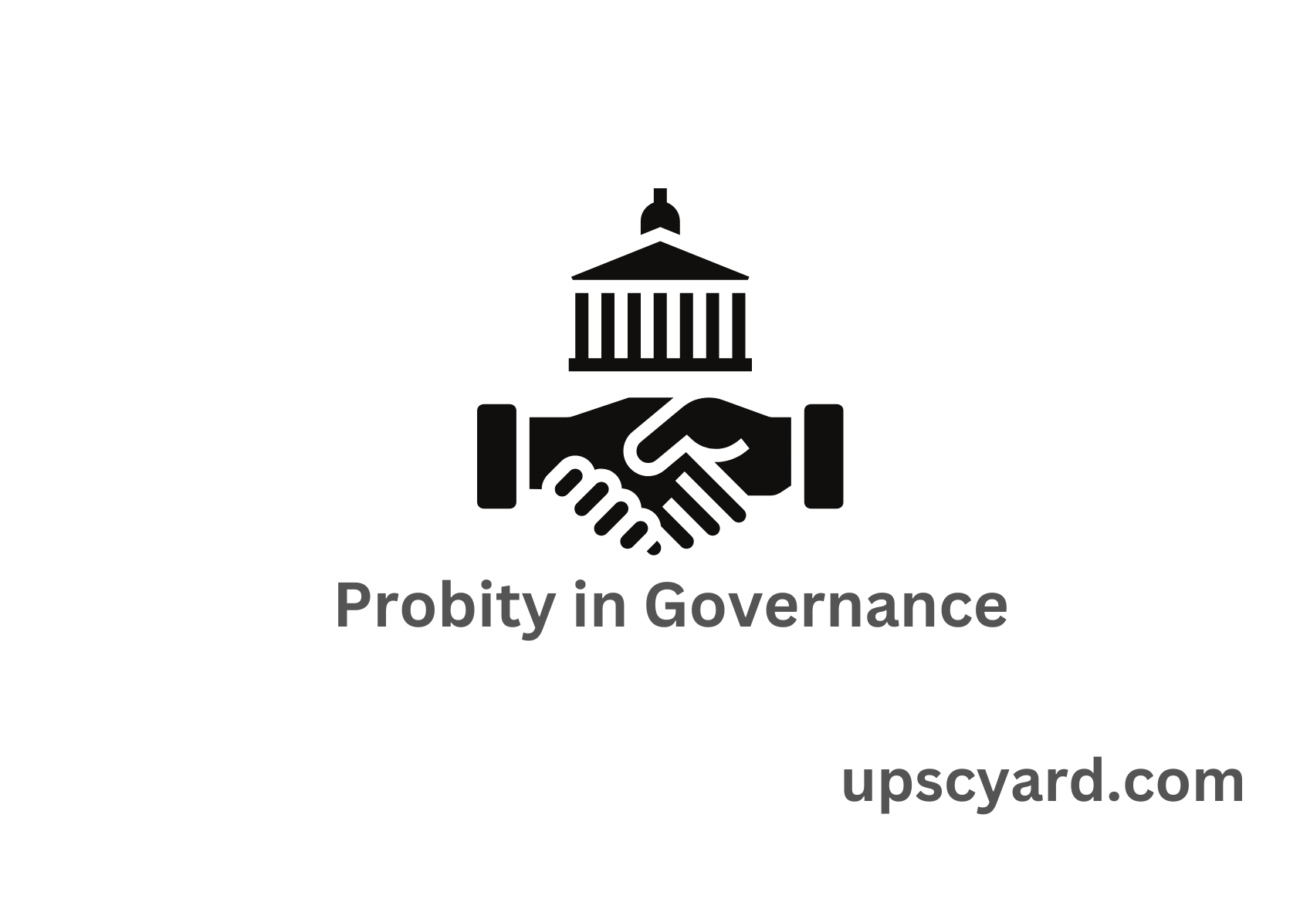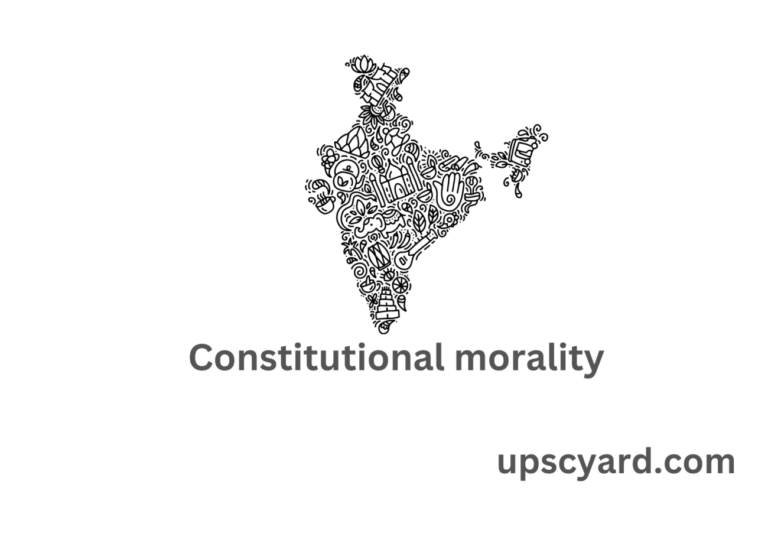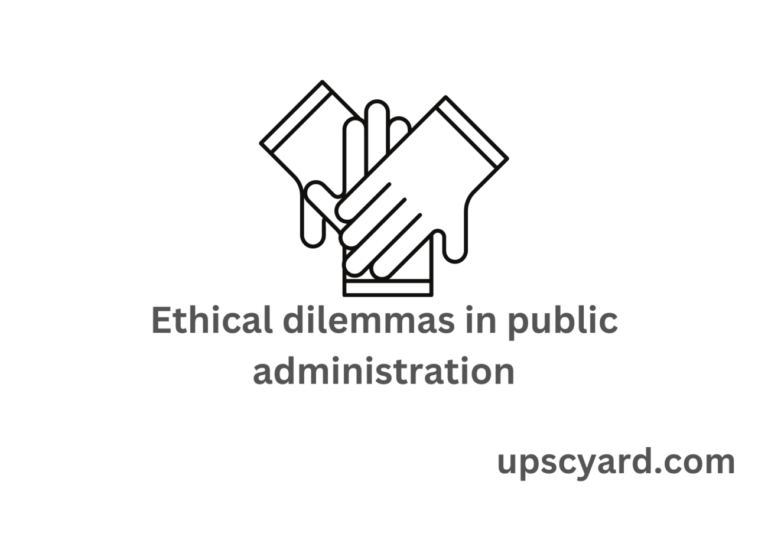Probity in Governance
Probity in governance is the embodiment of strong ethical and moral values throughout the decision-making and implementation processes. The term “probity” is derived from Latin, meaning “good,” signifying the importance of virtuous values in governance, such as honesty, accountability, integrity, and compassion.
It represents the adherence to moral principles and integrity in both personal and public interactions, highlighting the honesty and decency of individuals and organizations in their actions. Probity takes a maximalist approach to life, where individuals uphold the best principles and ideals, transcending mere avoidance of corrupt or dishonest practices in personal and public relations.
Governance, on the other hand, refers to the comprehensive process of decision-making and implementation involving government, civil society, NGOs, interest groups, and various stakeholders. Within this framework, probity plays a pivotal role, ensuring that decisions and actions are guided by strong moral principles, promoting transparency, trust, and credibility in the governance system.
The significance of probity in governance cannot be overstated
- Preserves public faith in government operations.
- Maintains integrity in public services.
- Ensures ethical behavior and accountability in governance.
- Builds trust and legitimizes the system.
- Enhances social capital and trust among the people.
- Promotes impartiality, non-partisanship, and non-discrimination for fairness.
- Facilitates optimum utilization of resources.
- Fosters efficiency and effectiveness in governance processes.
What forms the philosophical foundation of Governance and Probity?
Immanuel Kant, a prominent philosopher, places the concept of obligation at the core of morality, asserting that humans have a duty to respect other rational beings they encounter through the categorical imperative. He believes that applying rigorous reasoning techniques would be equally successful in addressing moral philosophy.
Various Indian scriptures and treatises, such as the Ramayana, Mahabharata, Bhagavad Gita, Buddha Charita, Arthashastra, Panchatantra, Manu Smriti, Kural, Shukra Niti, Kadambari, Raja Tarangini, and Hitopadesh, extensively delve into ethical aspects of governance.
According to Aristotle, virtues such as justice, kindness, and generosity are inherent tendencies that benefit both the individuals possessing them and the community they belong to.
The utilitarian perspective, on the other hand, advocates for maximizing pleasure for the greatest number of people as the standard of behavior.
Views of NCRWC on Probity in Governance
The National Commission to Review the working of the Constitution (NCRWC) conducted a detailed examination of ‘Probity in governance’ and underscored its significance in maintaining the integrity of the governance process. One of the primary requisites for ensuring probity in governance, according to the commission, is the eradication of corruption from the system.
In this context, the NCRWC referred to the observations made by Gunnyar Myrdal, a renowned Scandinavian economist-sociologist, who characterizes the Indian state as a ‘soft society.’ By labeling it so, Myrdal points to the lack of political will within the society to enact and implement laws that are essential for its progress and development.
What Myrdal emphasizes even more significantly is the importance of discipline within the society. He argues that without discipline, genuine and meaningful progress becomes unattainable. In this regard, it becomes evident that corruption, which is often rampant in societies with a lack of discipline, poses a significant challenge to probity in governance.
Corruption and indiscipline are intertwined and mutually reinforcing. The existence of one contributes to the proliferation of the other, creating a detrimental cycle that hampers the overall functioning of the society and its governance structures at various levels.
To instill discipline and promote probity, one of the crucial approaches involves reducing the opportunities for corruption and adopting stringent measures to tackle corrupt practices wherever they are found. This requires addressing the inadequacies in the criminal judicial system and ensuring that those engaged in corrupt acts face swift and decisive consequences.
Moreover, it is vital to recognize that corruption disproportionately affects the marginalized and vulnerable segments of society, exacerbating social and economic inequalities. Combating corruption, therefore, assumes even greater significance as it directly impacts the well-being of the underprivileged.
In conclusion, the NCRWC’s report underscores the need for probity in governance and highlights the interplay between discipline, corruption, and overall societal progress. Addressing corruption and instilling discipline are integral steps towards creating a transparent and accountable governance system that upholds the principles of probity and serves the best interests of the people.
Obstacles in Upholding Probity
The challenges in ensuring probity include:
- Absence of fear of accountability
- High level of inequalities among communities
- Lack of incentives
- Prevalence of hedonism
- Shortage of effective leadership
- Weak and ambiguous value system
- Poor work culture
- Discretion without transparency
Probity in politics , Jawaharlal Nehru – Mudgal episode
In 1951, a significant bribery scandal shook India’s Parliament, reminiscent of a similar incident that took place in the past. The scandal involved H G Mudgal, a member of the Indian National Congress and a Member of Parliament (MP). He was found guilty of accepting a bribe of Rs. 2,000 from the Bombay Bullion Merchants Association to advocate on their behalf in Parliament.
The exposure of Mudgal’s misconduct came from an unexpected source – Feroze Gandhi, who was not only a fellow Congressman but also happened to be the son-in-law of India’s then-Prime Minister, Jawaharlal Nehru. Gandhi took up the issue vigorously, marking the beginning of his famous parliamentary battles with his father-in-law.
Nehru, realizing the gravity of the situation and the need to restore public faith in the institution of Parliament ahead of the country’s first popular election, swiftly moved a resolution for Mudgal’s expulsion. Despite Mudgal’s resignation before the vote, Parliament proceeded with his expulsion, making it clear that such behavior would not be tolerated.
Following the scandal, Nehru sent a letter to all chief ministers emphasizing the importance of maintaining high standards of behavior for parliamentarians. He warned that any laxity in this regard could jeopardize the reputation of the legislatures and ultimately pose a threat to democracy itself.
Nehru’s thunderous speech justifying Mudgal’s expulsion had promised the formation of a committee to frame rules of conduct for MPs. However, latent resistance from MPs delayed the formation of this committee for 46 years in the Rajya Sabha and 50 years in the Lok Sabha.
The incident served as a wake-up call for the leaders of the day, but the delay in implementing comprehensive guidelines for parliamentary conduct revealed a reluctance among MPs to subject themselves to stricter scrutiny.
In summary, the bribery scandal involving H G Mudgal in 1951 exposed the need for transparency and accountability in India’s parliamentary system. It led to the expulsion of a corrupt MP and spurred discussions about framing rules to maintain the dignity and integrity of Parliament, but it also revealed the challenges in implementing such reforms.




